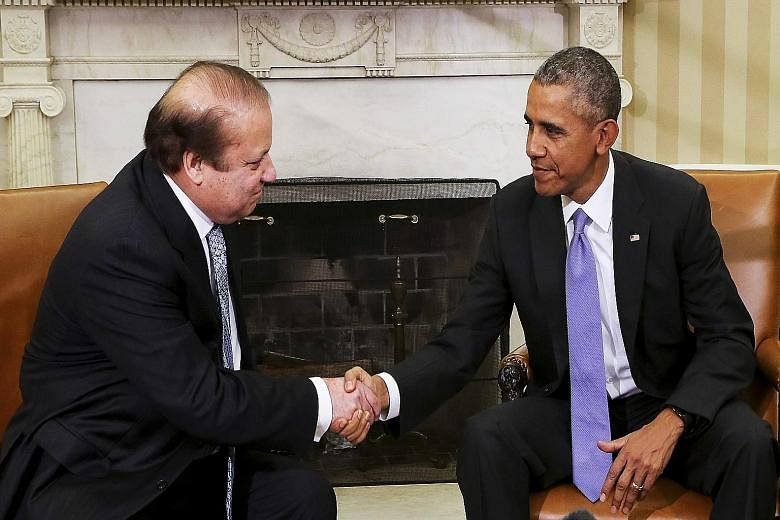WASHINGTON • At a time of heightened tensions between nuclear- armed rivals India and Pakistan, United States President Barack Obama urged Pakistan on Thursday to avoid developments in its nuclear weapon programme that could increase risks and instability.
In talks with Pakistani Prime Minister Nawaz Sharif at the White House, Mr Obama also sought help in getting the Afghan Taleban back to peace talks, something vital to his faltering bid to bring US troops back from Afghanistan.
With tensions high between Pakistan and India, Washington has been concerned about Pakistan's development of new nuclear weapon systems, including small tactical nuclear weapons, and has been trying to persuade Pakistan to make a unilateral declaration of "restraint".
But Pakistani officials said Islamabad will not accept limits to its nuclear weapon programme and argued that smaller tactical nuclear weapons are needed to deter a sudden attack by India.
In reference to Pakistan's nuclear weapon programme, Mr Obama "stressed the importance of avoiding any developments that might invite increased risk to nuclear safety, security, or strategic stability", said a White House statement.
In a joint statement, both Mr Obama and Mr Sharif said "all sides" should act with restraint and work towards strategic stability in South Asia.
The statement said both leaders expressed their commitment to the Afghan peace process and called on Taleban leaders to enter into direct talks with Kabul, which have stalled since inaugural discussions in Pakistan in July.
The talks broke down after the Afghan intelligence agency said Taleban leader Mullah Omar had been dead for two years.
"It's a setback, no doubt, and it will take some time to overcome this setback, but we will try again," Mr Sharif told reporters after meeting Mr Obama.
In his talks with Mr Sharif, Mr Obama also raised concerns about Americans held hostage by militants in that region and welcomed Mr Sharif's offer to assist in ensuring their safe return, the White House said, in an apparent reference to an American couple kidnapped in Afghanistan in 2012.
Despite the tensions, the Obama administration is preparing to sell Islamabad eight F-16 fighter jets in a bid to bolster ties, said a US source familiar with the matter.
The joint statement made no mention of the sale, which the US Congress could block, but said Mr Sharif "expressed satisfaction with the cooperation achieved in defence relations".
REUTERS

